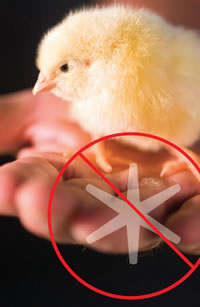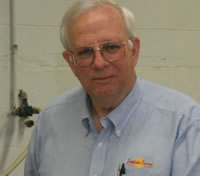 We Take Care Of The Little Things We take care of the little things,”
Dr. David Wicker, director of live
operations at Fieldale, says modestly of
the company’s success.
Lots of little things, apparently. In a recent visit to Fieldale Farms, Intestinal Health sat down with Wicker and his associate, Dr. John Smith, director of health services, to talk about Fieldale’s operation and its winning formula for growing birds, managing disease and meeting the changing needs of consumers. No asterisksWicker, who has been with the company since 1994, says just under a quarter of the 3.2 million birds Fieldale processes each week are for the company’s Springer Mountain Farms brand. Those birds receive no coccidiostats, no chemicals, no antibiotics. “That means not in the feed, not in the water, not by any other route,” Wicker says, adding “There are no asterisks on our birds.”In addition, all Springer Mountain Farms birds are certified by the American Humane Association. The rest of their flocks are conventionally raised using a closely monitored rotation of approved in-feed anticoccidials, antibiotics and vaccines. Get them started rightThe drug-free Springer Mountain birds are generally in the range of 2.7 kg (6 lbs) when sent to processing, while conventionally raised birds are grown to three sizes: 1.9 kg (4.20 lbs) at 37 days; 2.6 kg (5.85 lbs) at 47 days; and 2.7 kg (6 lbs) at 50 days.Fieldale processes about 165 million birds each year. “We’re about three times the size of an average complex, so that gives us a lot of flexibility for separating our conventional birds into the various weights when we get them to our processing plants,” Wicker explains. The company does not separate birds by gender. Like most commercial poultry operations, Fieldale uses four different rations for its birds — a starter, a grower, a finisher and a withdrawal feed. Fieldale nutritionists naturally pay close attention to all their birds’ rations. But, Wicker adds, “That’s especially important with drug-free birds — to get them started right since they don’t have antibiotics to help them along.” For example, even relatively small differences in the quality of feeds and the way they are milled can make a big difference in how birds start and grow, he says. Subclinical disease saps profits Smith: “Even subclinical levels [of coccidiosis] impact the growth of our birds.” The diseases that pose the most
significant challenges for Fieldale, in
terms of maintaining performance and
profitability, are infectious bronchitis,
infectious bursal disease (IBD) and, more
recently, runting and stunting syndrome
(RSS). “IBD and RSS are immunosuppressive,
so that means that even at
subclinical levels, they’re eating away at
our bottom line — the performance of
our birds,” Smith says.
In drug-free birds, Fieldale has been relying primarily on biologicals to bolster immunity, both at the maternal level and at the individual broiler level. In all of their birds — both drug-free and conventional — they use commercial killed vaccines to control IBD. In their breeder hens (which supply chicks for both the drug-free and the conventional brands), they augment that regimen with autogenous bursal vaccines. Smith explains that the bursal program in the hens is aimed not at controlling IBD in the hens but, rather, protecting their broiler progeny. They have also been experimenting with some of the new recombinant vaccines derived from turkey herpesvirus — so-called HVT-vectored vaccines — to combat infectious laryngotracheitis and IBD. Coccidiosis is another major concern for Fieldale. “It’s something we have to deal with on nearly a constant basis because we know that even subclinical levels impact the growth of our birds,” Smith says. Fieldale’s approach to control includes vaccinating against coccidiosis and, in conventional birds, vaccination in rotation with judicious use of ionophores. During winter, when cold and dampness tend to put extra stress on birds, they shuttle in synthetic or chemical anticoccidials plus ionophores. For the remainder of the year they tend to run ionophores only but rotate them as needed. The impact of late coccidiosis challengeRecent studies conducted by veteran poultry researcher Dr. Robert Teeter, a nutritionist at Oklahoma State University, show that although coccidiosis is costly at any time in the broiler’s life, it is most costly when it occurs late in the production cycle, when more money has been spent on feeding and housing the bird.Smith has made similar observations, though he arrived at that conclusion from different experience. When the anticoccidial diclazuril became available to the US poultry industry 9 years ago, it had a dramatic effect — not just on coccidiosis but also in opening everyone’s eyes as to how costly subclinical coccidiosis can be. The added control of the new anticoccidial also helped improve feed-conversion rates. “Frankly, it was shocking to a lot of us,” Smith says. He points out, however, that diclazuril, like other anticoccidials, eventually ran up against problems with resistance, so Fieldale and other growers had to scale back on its use. Still, their brief affair with diclazuril demonstrated to Fieldale and to other producers that they could be more diligent controlling coccidiosis and thus ensure better control late in the growing cycle. “That’s where coccidiosis vaccine comes in,” Smith says. “It allows you to rest the drug for a period of time. Research has shown that helps you restore some drug sensitivity.” Maintaining flexibility is key "There are no asterisks on our birds." DR. DAVID WICKER Smith says that in their conventionally
raised birds he rotates drugs and vaccines
to make sure birds have especially good
protection during winter and spring
when coccidiosis pressure is greatest.
Oftentimes decisions about which drug or
vaccine to use are made case by case, with
no set pattern for specific control options.
If, for example, moisture and oocyst levels in a house are not favorable in the late
winter/early spring, then conventional
birds may remain on in-feed anticoccidials
longer than usual. If conditions are not
so challenging, birds may go on a
vaccine sooner.
“For us, that’s one of the main differences between the conventional and drug-free birds,” he says. “With the conventional birds, litter condition is somewhat less critical. But with drug-free birds, it’s essential you maintain good housing conditions all the time.” Wicker adds that Fieldale invests considerable time and expense working with contract growers to maintain good housing conditions. That investment has paid off. “The better the growing conditions you have, the more efficient the birds are,” he says. Necrotic enteritis has not been a significant problem for Fieldale, especially during the past couple of years. Both Wicker and Smith think that may be partly due to the longtime experience the company has accumulated in raising drug-free birds. Necrotic enteritis (NE) is a complex disease that’s not totally understood, but some researchers believe that intestinal irritation, from coccidiosis or other causes, can provide a portal for the most common causative organism, Clostridium perfringens. Wicker and Smith say they think that keeping birds’ intestinal tracts healthy can go a long way toward preventing problems with NE. Gangrenous dermatitis: an intestinal link?Some researchers think another
profit-sapping disease, gangrenous
dermatitis (GD), may, too, be linked to
poor intestinal health — specifically,
coccidiosis “leakage” that can occur
when tired in-feed anticoccidials give
way to coccidial organisms late in the
broiler’s life cycle. Though evidence is
circumstantial, experience at Fieldale
perhaps adds some credence to
that theory.
Fieldale’s drug-free birds, which obtain lifelong protection against coccidiosis from vaccination, don’t experience problems with GD either, even during the challenging winter months when GD can affect as many as 20% of Fieldale’s conventional birds. Smith says, “I think that for a grower who’s dealing with dermatitis, coccidiosis vaccination would certainly be one of the options he would he consider." Another strategy Fieldale has been employing — and one that’s been used more steadily in recent years — is using enzymes in their birds’ diets to help cut down on phosphorus intake and increase the digestibility of the ingredients that are already in the feed. The progressive Fieldale operation optimizes the use of alternative ingredients in its feeds — the newest being distillers’ grains, a byproduct of the ethanol industry. Pearl millet is another alternative ingredient they have evaluated, though recently it has become less attractive due to price increases. Wicker works closely with the extension service at the University of Georgia to find alternatives that can be grown locally, thus helping cut down on costs of getting ingredients to the mill. There has been considerable research in recent years showing that certain grains irritate the delicate gut lining of chickens more than others. Researchers have found that that sort of irritation can make birds more susceptible to diseases like coccidiosis, necrotic enteritis and gangrenous dermatitis. Wicker says Fieldale maintains close scrutiny of how various feed components affect their birds. “We have the best lab in the industry for analyzing our feed,” he says, adding that if a problem becomes apparent he’s not shy about calling suppliers of ingredients, or purchasing or milling to make sure it gets resolved quickly. Combining big-company/ small-company traits Wicker: “You could say we're nimble on our feet.” “We’ve got a compact, family-run organization,” Wicker says. “We’re not spread out into seven states.” That means that both he and Smith can see any of their flocks within an hour and a half. But on the other hand, Wicker continues, “We’re not too small. We can afford to have a nutritionist here. We can afford to have a veterinarian here.” And that blending of big-company/small-company traits, Smith says, allows Fieldale to respond quickly and effectively to rapidly changing situations. Wicker adds with a smile, “You could say we’re nimble on our feet.” Regresar a North American Edition (#3) |




 © 2000 - 2021. Global Ag MediaNinguna parte de este sitio puede ser reproducida sin previa autorización.
© 2000 - 2021. Global Ag MediaNinguna parte de este sitio puede ser reproducida sin previa autorización.